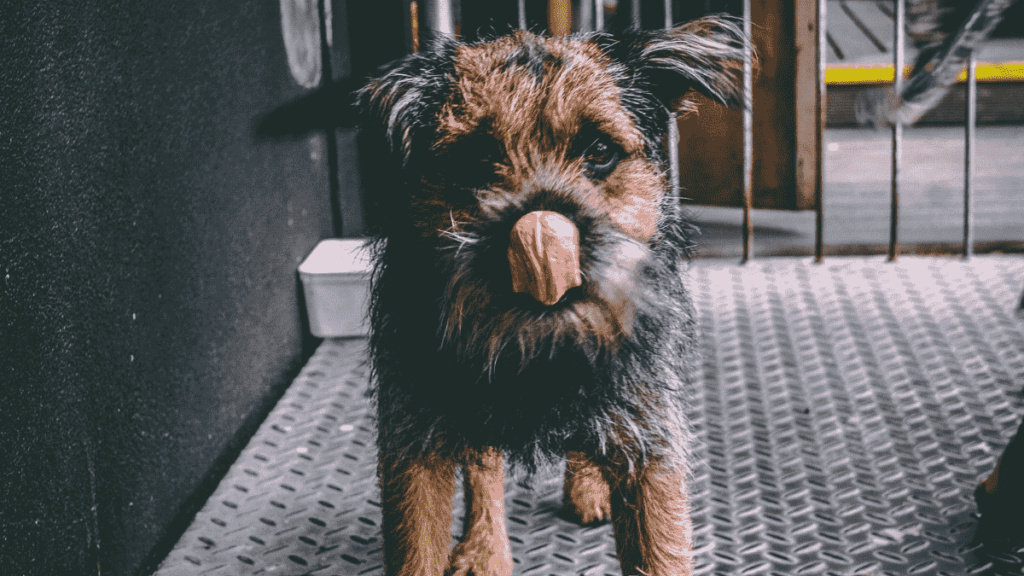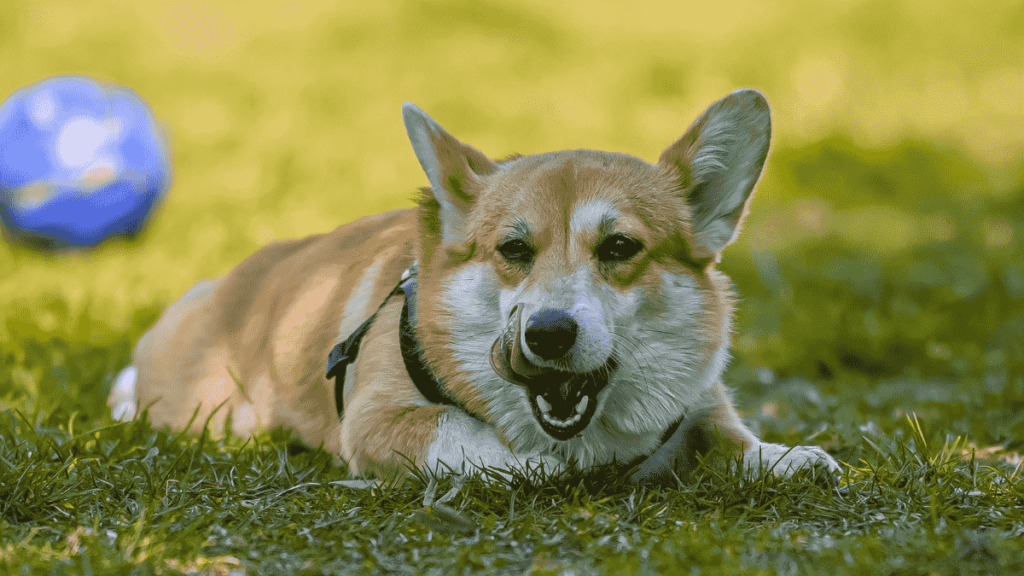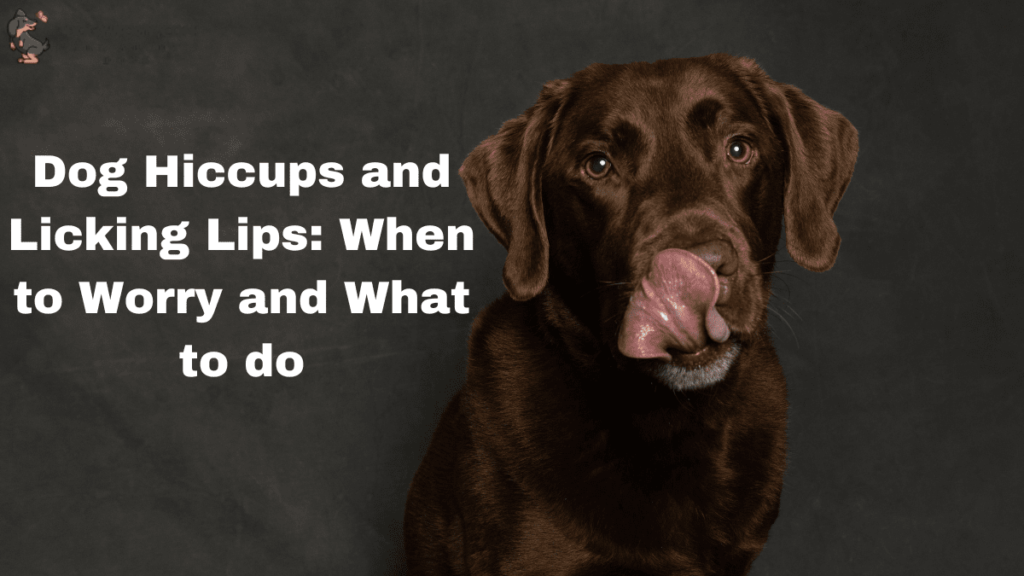Having a dog as a companion is a wonderful experience, as we enjoy their playful antics and endearing behaviors. Our furry friends communicate with us in many unique ways, from wagging tails to joyful barks. In some instances, however, our pets may behave in a peculiar manner that leaves us wondering about their well-being. Hiccups and licking lips are both behaviors that often cause eyebrows to rise. Here, we will discuss the causes of dog hiccups and licking lips and what you can do to alleviate your dog’s discomfort. Discover the mystery behind these canine behaviors by appreciating the moment and taking action when necessary.
Dog Hiccups and Licking Lips
Having a dog with hiccups and licking its lips can be a concern for many pet owners. Although hiccups are a normal occurrence, changes in a dog’s behavior during a hiccup episode can be concerning. It is important to understand why these behaviors occur and when to seek help.
Dog Hiccups
In dogs, hiccups are a reflex action caused by irritation of the diaphragm muscle and phrenic nerve. Dogs’ diaphragms are dome-shaped muscles in the chest that are important for breathing. Hiccups that are accompanied by coughing, lethargy, vomiting, or other symptoms may indicate an underlying condition.
Licking of Lips
Lip licking can indicate stress or discomfort in dogs. In most cases, dogs do not lick their lips when they have hiccups. It is possible, however, that licking the lips during a hiccup episode indicates that the dog is experiencing discomfort due to esophagitis or inflammation of the esophagus.
Causes of Dog Hiccups and Lips Licking
Dog hiccups and lip licking can be concerning for pet owners since they may indicate underlying health issues. The following reasons often cause these behaviors:
Esophageal Irritation
Hiccups and lip licking in dogs can be caused by esophageal irritation. During esophagitis, inflammation of the esophagus can result in irritation of the phrenic nerve of the diaphragm, resulting in hiccups. As a result of the discomfort caused by the inflammation, dogs may lick their lips.
Dogs who suffer from esophageal irritation and inflammation can experience symptoms like dizziness, nausea, and excessive lip licking. If the dog is experiencing discomfort, he or she needs medical attention.
Gastroesophageal Reflux Disease (GERD)
A large number of dogs suffer from hiccups and lip licking as a result of gastroesophageal reflux disease (GERD). Dogs with GERD can experience pain, discomfort, and irritation from stomach acids regurgitated into their esophagus, leading to continuous licking, swallowing, and hiccupping. It is a response to the burning sensation in the dog’s throat caused by the acid coming up from the stomach.
Nausea or Anxiety
Nausea and anxiety can contribute to dog hiccups and lip licking. In response to nausea, a dog might drool, lick his lips, or consume grass. When a dog feels hypersalivated, he/she might eat grass, drool, or lick his lips. In some cases, symptoms like burping, drooling, and excessive licking may indicate that the dog is feeling nauseous or anxious. Furthermore, persistent hiccups and lip licking, especially after meals, can be signs of nausea or anxiety in dogs.
Other Medical Conditions
Other medical conditions can also cause dog hiccups and lip licking, including:
a) Infections
Dogs can experience hiccups and lip licking due to various infections, including respiratory, dental, and systemic infections.
b) Allergies
Food and environmental allergies can cause inflammation and discomfort in dogs, resulting in hiccups and lip licking.
c) Poor Digestion
Dogs with poor digestion may experience hiccups and lip licking due to gastrointestinal upset.
d) Food Intolerances
If certain foods or ingredients are intolerant to dogs, they may suffer from hiccups and lip licking.
e) Liver or Kidney disease
In dogs, liver or kidney diseases can cause metabolic imbalances, resulting in hiccups and lip licking.
f) Obesity
There is evidence that canine obesity can put pressure on the gastrointestinal tract, causing discomfort and hiccups.
g) Medications
Hiccups and gastric reflux can occur as a side effect of certain medications, including antibiotics, antidepressants, and steroids.
If your dog exhibits any additional symptoms, such as lethargy, vomiting, coughing, or lack of appetite, there may be something more serious going on. Immediately notify your veterinarian if you are experiencing these symptoms.
How to Stop a Dog Hiccups and Lips Licking

Dog hiccups and licking of lips can be caused by inflammation of the esophagus, known as esophagitis or gastroesophageal reflux disease (GERD). To stop your dog’s hiccups and licking of lips, you can try the following treatments:
1. Gentle Massage
When dogs experience hiccups and lip licks, a gentle massage can help relieve the problem. The following is a note on how to perform a gentle massage to stop hiccups and lip licking:
- Choose a quiet and comfortable location: Choose a peaceful place where your dog can feel safe and relaxed.
- Use gentle pressure: Use gentle pressure on the affected area to regulate breathing by relaxing the diaphragm.
- Focus on the diaphragm: Place your hand just below the rib cage on your dog’s stomach and gently massage it.
- Apply pressure to specific points: You can also apply pressure to other points on your dog’s body, such as the inner end of the eyebrow towards the nose, also known as the supraorbital notch. After a few seconds, apply gentle pressure to the other side of this point.
- Circular motion: When massaging your dog’s diaphragm or applying pressure to the supraorbital notch, use a circular motion.
- Duration: Massage for a few minutes or until your dog stops hiccupping and licking his lips.
- Repeat as needed: You may need to repeat the massage if your dog’s symptoms worsen or persist.
Remember to consult your veterinarian if your dog’s hiccups and lip licking are persistent or accompanied by other symptoms.
2. Feed Lighter and More Frequent Meals
It is possible to prevent dog hiccups and lip licking caused by overeating or excessive air consumption by feeding lighter and more frequent meals. Maintaining a calm environment for your dog to eat and drink will prevent them from overeating by regulating their food intake. Using a slow-feeder bowl will ensure they’re eating at a moderate pace by encouraging slow eating. To rule out any serious problems, you should see a veterinarian if your dog is experiencing hiccups and lip licking.
3. Withdraw Food
Food withdrawal is not a specific method for stopping hiccups and lip licking in dogs. However, feeding your dog in small quantities can allow their esophagus to recover.
4. Gastroesophageal Reflux Disease (GERD) Treatment
If GERD is the underlying cause, you can speak to your veterinarian about appropriate treatment options. Medications like Pepcid AC can be given over-the-counter at a dose of 5 mg for every 25 pounds of weight every 24 hours. Still, it’s important to consult your veterinarian before giving your dog any medication.
5. Monitor for Additional Symptoms
Hiccups that are accompanied by a cough, lethargy, or vomiting may be a sign of an underlying illness that requires veterinary care.
If your dog’s symptoms persist or worsen, consult your veterinarian before starting any new treatment.
When to Seek Veterinary Help
Having your dog experience hiccups and licking its lips could indicate an underlying problem. Here are some instances when you should seek help for your dog’s hiccups and lips licking:
- Persistent Symptoms: If your dog’s hiccups and lip licking persist or occur frequently, seek veterinary help.
- Accompanying Symptoms: When hiccups are accompanied by coughing, lethargy, or vomiting, it may indicate an underlying illness that requires veterinary care.
- Concerns about Gastroesophageal Reflux Disease (GERD): If you suspect your dog has GERD, characterized by frequent hiccups, swallowing, and licking, consult a veterinarian.
- Unusual Behavior: Veterinary assistance is recommended if your dog is showing signs of distress during hiccups, such as frantically gulping or licking its lips excessively.
Why is My Dog Keeps Swallowing and Licking?
There are several reasons why your dog may be excessively licking and swallowing. In an attempt to alleviate excessive saliva caused by feeling unwell, dogs lick their lips and swallow in order to relieve nausea. The dog may need to be seen by a veterinarian if the symptoms persist, especially if the dog starts licking unusual objects. Moreover, mouth issues, such as the presence of a foreign object or dental problems, could be contributing to the behavior. The dog’s mouth should be examined carefully for swelling under the tongue or along the jawline. It is crucial to seek professional veterinary attention if any abnormalities are detected in order to rule out dental disease or other potential health concerns causing excessive licking and swallowing.
Why is My Dog Keeps Licking everything and Gagging?
Several reasons could be behind your dog’s habit of constant licking and gagging. An underlying medical condition such as nausea, gastrointestinal problems, or respiratory problems may cause gagging. A licking response could indicate discomfort or an attempt to soothe an irritated throat. This behavior can also be caused by dental problems, such as a foreign object stuck in the mouth or throat. Ingestion of toxic substances can also cause gagging. Allergies, anxiety, or stress can cause excessive licking. It’s crucial to observe your dog’s overall health any accompanying symptoms, and consult with a veterinarian in order to identify the specific cause. Getting professional advice will help determine whether a medical concern, a behavioral issue, or a combination of factors causes your dog’s licking and gagging behavior.
Why is my Dog Licking the Air and Gulping?

It may be a sign of gastric upset if your dog licks the air. In addition to licking the air, your dog may also lick surfaces, gulp, and swallow. Acid reflux can cause air licking and swallowing due to irritation of the esophagus. Your dog may have difficulty digesting their food. Digestion problems can also be treated with probiotics. In addition, your dog may have an intolerance to one or more of the ingredients in their food.
If your dog licks the air after meals and doesn’t seem to be improving after changing their diet, consult your veterinarian. Dogs who lick excessively are more likely to suffer from chronic pancreatitis, giardia infection, and irritable bowel syndrome.
It is common for dogs to make a funny face when exposed to strange odors. A Flehman Response results in your dog chattering their teeth or licking the air, which directs the odor to the Jacobson’s organ located at the roof of their mouth.
Despite being less common, air licking can be a compulsive behavior. When prolonged air licking does not seem to be linked to gastric upset or new odors, it may be a symptom of canine OCD or cognitive dysfunction.
Why Does my Dog get Hiccups at night?
Occasionally, dogs experience hiccups during the night, just like humans. Generally harmless, hiccups can be caused by eating too fast, excessive water consumption, heightened stress, excitement, gas in the stomach, or temperature changes in dogs.
It is rare for dog hiccups to indicate an underlying health issue, as they are typically benign and can resolve on their own. It may be amusing to observers, but dog owners may worry about their pets’ discomfort. Hiccups are generally less alarming than more serious respiratory issues such as wheezing or excessive coughing.
It’s generally okay to let hiccups run their course, but persistent hiccups should prompt a veterinarian visit. Professional guidance can help rule out any potential medical conditions causing the prolonged hiccupping, ensuring the dog’s overall well-being.
Final Thoughts
In conclusion, a variety of factors can cause hiccups and lip licking in dogs, including overeating, acid reflux, and stress. While hiccups are usually harmless, persistent symptoms or accompanying symptoms may indicate a health issue requiring veterinary attention. Hiccups and lip licking can be alleviated by controlling your dog’s mealtime habits, providing a calm environment, and massaging him gently. In addition, GERD or acid reflux can also be managed by eating a low-fat prescription diet, taking antacids, or taking other medications. It is important to seek veterinary help if your dog experiences persistent symptoms so you can determine the underlying cause and how to treat it. By understanding the causes and symptoms of hiccups and Lip licking, pet owners can ensure their dog’s health and well-being.

